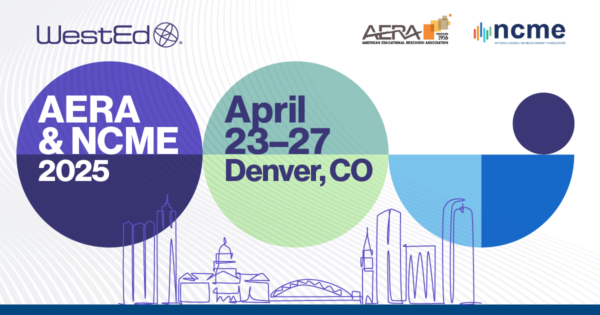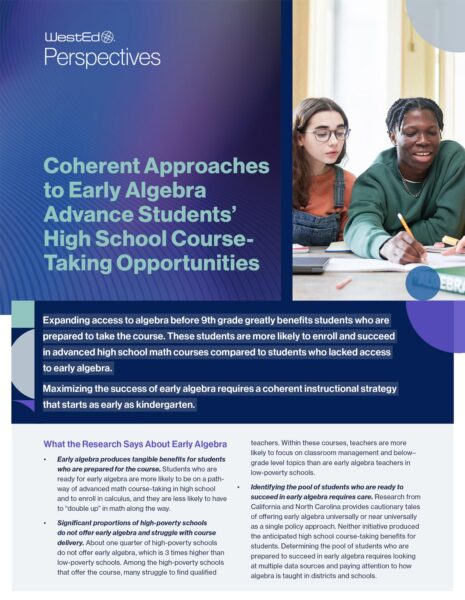Overview
Kirk Walters is a math education researcher whose projects rigorously evaluate the implementation and effects of promising math programs and strengthen connections between research and practice. As a Vice President, Walters leads his own projects and provides strategic direction for mathematics and improvement science content areas.
Walters is currently leading a national impact study of a middle school math program that promotes math, SEL, and citizenship outcomes; two studies of the implementation and impact of Illustrative Mathematics; an efficacy study of a community college statistics corequisite course; and an implementation study of a video-based professional learning program for math coaches. He is also a facilitator of a community of practice of math practitioners, researchers, and curriculum developers and an advisor on math practical measurement and adult numeracy projects. His work has been funded by the Institute for Education Sciences (IES), the Office of Elementary and Secondary Education (OESE), the Office of Career, Technical, and Adult Education (OCTAE), the National Science Foundation (NSF), private foundations, and local education agencies.
Prior to joining WestEd, Walters was a middle and high school math teacher for nearly a decade in urban public schools in the greater Los Angeles and Washington, DC, areas. This experience continues to inform his work and commitment to strengthening the connections between practice and research. He believes all math classrooms can and should be laboratories that promote continuous improvement, curiosity, deep understanding, perspective taking, and joy.
Education
- PhD in social foundations of education, University of Maryland
- MA in curriculum and instruction, Chapman University
- BSE in social studies education (minor in mathematics), John Brown University
Select Publications
Witherspoon, E. B., Pardo, M., Walters, K., Garrett, R., Hilbert, M., Ford, J., Hsin, L. B., Rodgers, M. A., Garcia Piriz, D., Burr, L., & Thornley, L. (2024). Teacher use of an online platform to support independent practice in middle school mathematics during COVID-19 disruptions. AERA Open, 10. https://doi.org/10.1177/23328584241230054
Smith, T. M., Walters, K., Griffin, M., Jones, W., Len non, V., & Sanders, Z. (2023). The better math teaching network: Lessons learned from a 5-Year Instructionally Focused NIC. Nellie Mae Educational Foundation.
Perry, R., Takahashi, S., Walters, K., & Knotts, A. (2022). Building and using a practical measures repository to help mathematics educators center equity discussions and take action [Paper presentation]. The National Council of Supervisors of Mathematics Annual Conference, Anaheim, CA, United States.
Walters, K., Garrett, R., Garcia-Piriz, D., Burr, L., Ford, J., Hibbert, M., Pardo, M., Rodgers, M., Thornley, L., & Witherspoon, E. (2022). An effectiveness study interrupted: Understanding the impacts of ASSISTments during the COVID-19 pandemic [Paper presentation]. The Association for Education Finance and Policy Annual Meeting, Denver, CO, United States.
Walters, K., Knotts, A., Takahashi, S., & Perry, R. (2022). Practical measures to promote equitable middle grades math instruction [Accepted presentation]. The National Council of Teachers of Mathematics Annual Conference, Los Angeles, CA, United States.
Williams, R., Citkowicz, D. I., Miller, Lindsay, J., & Walters, K. (2022). Heterogeneity in mathematics intervention effects: Evidence from a meta-analysis of 191 randomized experiments. Journal of Research on Educational Effectiveness.
Smith, T. M., Walters, K., Griffin, M., Sanders, & Lennon, V. (2020). The better math teaching network: Lessons learned from the second year. Nellie Mae Educational Foundation.
Walters, K., Smith, T. M., Griffin, M., Sanders, & Lennon, V. (2020). The better math teaching network: Lessons learned from the third year. Nellie Mae Educational Foundation.
Rickles, J., Heppen, J. B., Allensworth, E., Sorensen, N., & Walters, K. (2018). Online credit recovery and the path to on-time high school graduation. Educational Researcher, 47(8), 481–491.
Walters, K., & Knudson, J. (2018). Improving algebra achievement systemically: Lessons learned from three districts. Office of Elementary and Secondary Education, High School Graduation Initiative, U.S. Department of Education.
Heppen, J. B., Sorensen, N., Allensworth, E., Walters, K., Rickles, J., Stachel, S., & Michelman, V. (2017). The struggle to pass algebra: Online vs. face-to-face credit recovery for at-risk urban students. Journal of Research on Educational Effectiveness, 10(2), 272–296.
Rickles, J., Williams, R., Meakin, J., Lee, D., & Walters, K. (2017). The effect of TenMarks Math on student achievement. American Institutes for Research.
Walters, K., Heppen, J., Taylor, S., Sorensen, N., Rickles, J., & Clements, P. (2017). Getting back on track: What math content is taught and learned in online and face-to-face algebra credit recovery courses? American Institutes for Research.
Walters, K., Smith, T. M., Kristapovich, P., & Gaetano, J. (2017). The better math teaching network: Lessons learned from the first year. Nellie Mae Educational Foundation.
Garet, M. S., Heppen, J. B., Walters, K., Parkinson, J., Smith, T. M., Song, M., Garrett, R., Yang, R., & Borman, G. D. (2016). Focusing on mathematical knowledge: The impact of content-intensive teacher professional development (NCEE 2016-4010). National Center for Education Evaluation and Regional Assistance, Institute of Education Sciences, U.S. Department of Education.
Heppen, J. B., Clements, P., & Walters, K. (2015). Turning to online courses to expand access: A rigorous study of the impact of online Algebra I for eighth graders. In J. Middleton, J. Cai, & S. Hwang (Eds.), Large-scale studies in mathematics education. Springer Publishers.
Walters, K., Smith, T. M., Leinwand, S., Surr, W., Stein, A., & Bailey, P. (2014). An up close look at student-centered math teaching: A study of highly regarded high school teachers and their students. Nellie Mae Educational Foundation.
Walters, K., & Sorensen, N. (2013). Can at-risk students get back on track? Results from a rigorous study of online and f2f Algebra: Implementation challenges and results [Paper presentation]. Spring Meeting of the Society for Research on Educational Effectiveness, Washington, DC, United States.
Heppen, J. B., Walters, K., Clements, M., Faria, A., Tobey, C., Sorensen, N., & Culp, K. (2012). Access to Algebra I: The effects of online mathematics for grade 8 students (NCEE 2012–4021). National Center for Education Evaluation and Regional Assistance, Institute of Education Sciences, U.S. Department of Education.
Garet, M., Wayne, A., Stancavage, F., Taylor, J., Eaton, M., Walters, K., Song, M., Brown, S., Hurlburt, S., Zhu, P., Sepanik, S., & Doolittle, F. (2011). Middle school mathematics professional development impact study: Findings after the second year of implementation (NCEE 2011-4024). National Center for Education Evaluation, Institute of Education Sciences, U.S. Department of Education.
Honors, Awards, and Affiliations
Reviewer, STEM Education Panel, U.S. Department of Education, Institute of Education Sciences
Reviewer, CAREER Panel, National Science Foundation
Expert Panelist, ReSolve Study, U.S. Department of Education
Research Advisory Council Member, Research Partnership for Professional Learning, Annenberg Institute for School Reform at Brown University
Expert Contributor, EF+ Math Program, Advanced Education Research & Development Program
Recent Media Appearances
Randomized Controlled Trials Remain the Gold Standard for Ed Tech Research, The 74, February 10, 2025
New efficacy study finds Desmos Math 6–8 significantly improves student learning outcomes in middle grades, Amplify, March 24, 2023
Portland-area schools deploy extra efforts as test results peg Oregon’s academic slide as among worst in nation, Oregonian, February 22, 2023
Connecting Sport and Community, Fresh Perspectives, April 26, 2021
Fayetteville teacher taking part in statewide mathematics initiative, Fayette Tribune, February, 27 2020











